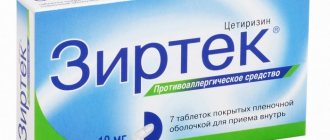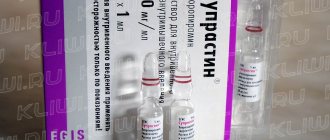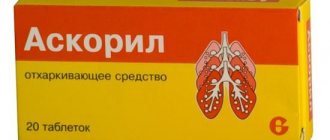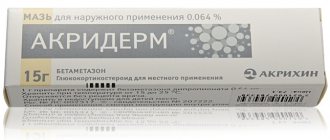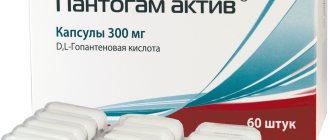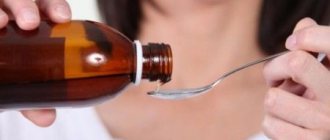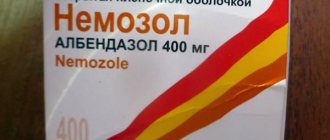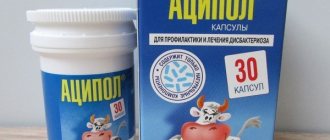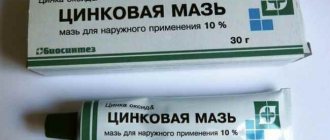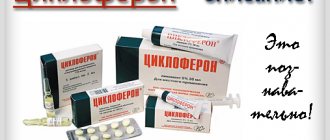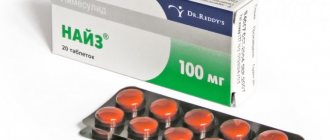Is it possible to use Fenistil during pregnancy? Composition, release forms, contraindications
Author: fabrica · Published 03/13/2019 · Updated 05/21/2019
During pregnancy, a woman’s immune system malfunctions. As a result, allergic reactions occur frequently. Among pregnant women, the number of allergy sufferers is more than 20%. The expectant mother immediately has a question about how to alleviate her condition without harming the baby. Let's consider what Fenistil contains, whether it can be taken during pregnancy in each trimester, whether the drug is suitable for the treatment of allergic dermatitis and what reviews it has.
Interaction with other drugs
To enhance the therapeutic effect of the drug "Fenistil" in the form of a gel, it is allowed to combine it with drops of the same name for oral administration. In especially severe cases, accompanied by external manifestations of an allergic reaction, the use of the gel is combined with glucocorticosteroid drugs or hormonal ointments.
There is no other data on the interaction of Fenistil Gel with various medications. If the patient is taking antihistamines, he should warn the doctor about this.
If you believe the reviews, Fenistil Gel is prescribed very often for children.
About the drug
The antihistamine drug Fenistil belongs to the second generation of drugs. It is not hormonal. It is antiallergic and helps with:
- itchy dermatosis;
- eczema;
- hives;
- neurodermatitis;
- Quincke's edema.
Release forms: drops, gel, emulsion, tablets
Currently available for sale:
- Drops. Transparent liquid, odorless and colorless. Packaging: a 20-milliliter dark glass bottle with a dropper.
- Gel. Colorless opalescent gel. Packaging: 30 or 50 gram tube.
- Emulsion. Semi-liquid homogeneous emulsion of white color. It has a specific smell of benzyl alcohol. Plastic bottle with an applicator with a volume of 8 milliliters.
- Fenistil 24 tablets. White gelatin capsules. Packaging – 10 pieces per slide.
The main component in all four formulations is dimethindene maleate in varying concentrations.
- in drops the concentration is 1 per 1 milliliter;
- in gel 100 per 100 grams;
- in emulsion 1 to 1 gram;
- in tablets 4 per 1 piece.
Additional components in the preparations:
- Drops – water, sodium hydrogen phosphate dodecahydrate, propylene glycol, citric acid monohydrate, sodium saccharinate, benzoic acid, disodium edetate.
- Gel – water, disodium edetate, propylene glycol, carbomer, benzalkonium chloride, sodium hydroxide.
- Emulsion - water, benzalkonium chloride, propylene glycol, benzyl alcohol, sodium hydroxide solution, butylated hydroxytoluene, carbomer, disodium edetate, cetostearomacrogol, cocoyl caprylocaprate, liquid paraffin.
- Tablets - gelatin, lactose, dyes iron oxide yellow and red, microcrystalline cellulose, eudragit, pregelatinized starch, talc, glutamic acid, titanium dioxide, methylhydroxypropylcellulose, silicone emulsion.
Indications for use
Fenistil capsules and drops have the same indications for use during pregnancy. They are prescribed for such conditions of the body as:
- Quincke's edema.
- Drug allergy.
- Food allergies.
- Hives.
- Allergic fever.
Fenistil gel and emulsion are used during pregnancy in the following cases:
- Skin itching and urticaria due to atopic dermatitis.
- Itchy skin due to chickenpox, measles, etc.
- Insect bites.
- Low degree burns.
Compound
The basis of 1 ml of medicine in the form of drops is an active substance derived from phenylalkylamine, dimethindene maleate in an amount of 1 mg. Additionally, in the production of the drug the following are used:
- sodium phosphate 2-substituted, 12-water (0.016 g);
- tribasic carboxylic acid (0.005 g);
- benzoic acid (preservative – 0.001 g);
- disodium edetate (increases the permeability of the active substance through the membrane of mucous membrane cells - 0.001 g);
- sodium saccharinate (sweetener – 0.5 mg);
- propylene glycol (hygroscopic substance – 0.1 g);
- highly purified water (0.88 g).
The antihistamine is colorless and odorless and comes in a darkened glass bottle with a dispenser cap for portion measuring.
Can pregnant women take it?
This drug is not new and unstudied. Clinical studies have shown that the drug does not affect the development of the fetus, does not prevent a woman from becoming pregnant, and does not have toxic effects. However, manufacturers warn that research work was carried out on animals. The drug has not been fully studied in humans. The effects of Fenistil on pregnant women cannot be predicted with 100% accuracy.
In 1st trimester
Before the 13th week of pregnancy, Fenistil is contraindicated in any form. The components of the drug are strongly absorbed into the tissue, and the placenta in the fetus is not yet fully formed and does not have all the protective functions. In extreme cases, the use of the emulsion in small doses is permitted, for example, in acute Quincke's edema.
In the 2nd trimester
Starting from the 14th week of pregnancy, the placenta is completely formed, the fetus is under reliable protection, and now you can use gel and emulsion. This should be done exclusively according to the instructions and with the recommendation of a doctor. Drops are recommended to be taken only when absolutely necessary. The tablets are prohibited for use in pregnant women in the second trimester.
In the later stages
Recommendations for use in the 3rd trimester of pregnancy are similar to the 2nd trimester: use gel, emulsion and drops, possibly in small quantities and if strictly necessary. Tablets are not recommended.
Analogs
Fenistil can be replaced by using other antihistamines that exhibit a similar effect. These include:
- Zodak - syrup, tablets and drops containing cetirizine dihydrochloride;
- Claritin - antihistamine syrup, tablets based on loratadine;
- Loratadine - antiallergic tablets and syrup based on the component of the same name;
- Suprastin - antihistamine solution, tablets containing chloropyramine;
- Tavegil – solution for injection, tablets based on clemastine;
- Diazolin - pills and allergy tablets containing mebhydralin;
- Cetirizine - anti-inflammatory and antiallergic tablets containing the active ingredient of the same name;
- Zyrtec - antiallergic tablets based on cetirizine, should not be taken by children under one year of age;
- Psilo-balm is an antipruritic gel containing diphenhydramine, prohibited in children under two years of age.
How to use?
The drug is taken externally and orally, depending on its release form. The dosage and course of treatment for pregnant women depends on the degree, type and characteristics of the allergy.
You should not prescribe doses and temporary courses of treatment yourself. Consultation with a specialist is necessary. It is recommended to take the drug in short courses, during pregnancy no more than 7-10 days. If the symptoms of the disease pass faster than the specified interval, you should stop taking it.
- Drops. Used orally. Amount of 2 drops per 1 kg of weight in 3 doses. For drowsiness, 40 drops are prescribed before bedtime and 20 drops in the morning.
- Pills. Not recommended for use during pregnancy. In other cases, taken orally, 1 capsule per day, without chewing and with plenty of water.
- Gel and emulsion. Designed for outdoor use. For pregnant women, apply to the skin no more than 2 times a day, to small areas of the skin. Be sure to keep away from direct sunlight. In other cases, apply similarly, up to 4 times a day.
Fenistil analogs and substitutes
It is quite acceptable to replace Fenistil gel with inexpensive analogues that are safe for children and easy to use. It is quite possible to find an effective medicine that can be used without consequences for a year or more.
For very young children, it is best to use time-tested manufacturers. An old, effective and reliable remedy for drying and soothing the skin is Tsindol. This medicine is made on the basis of zinc oxide and is suitable for the youngest patients.
Natural-based medicines, essential oils and mixtures are considered the best choice for treating children who are too early to use strong drugs. For example, a bath with chamomile and calendula will help soothe irritated skin without the use of drugs. In each specific case, you need to look for your own way to minimize or relieve negative symptoms.
| A drug | Active substance | Manufacturer | Price, rub.) |
| Tsindol | zinc oxide | Ivanovo Pharmaceutical Factory, YuzhPharm (Russia) | from 48 to 135 rub. |
| Nezulin | D-panthenol | VIS Cosmetics LLC (Russia) | from 90 to 170 rub. |
| Hofitol | artichoke leaf extract | Rosa-Fitofarm Laboratory, Majoli Spindler Laboratory, GALENIK VERNAIN Laboratories (France) | from 400 to 1220 rub. |
| Elidel | pimecrolimus | Meda Manufacturing (France) | from 870 to 1750 rub. |
| Dermadrin | diphenhydramine | Montavit (Austria) | from 80 to 200 rub. |
| Ketocin | Ketotifen hydrofumarate, boric acid, zinc oxide, dimethyl sulfoxide | Red Star, KhFZ, PJSC, (Ukraine) | from 320 to 850 rub. |
Depending on the cause of the rash, ease of use and how much the medicine costs, you can choose a suitable analogue. European manufacturers are distinguished not only by their high prices, but also by their enhanced quality control and the amount of testing of drugs before release. Russian pharmaceutical companies win in terms of price and duration of use of the drug. The same Tsindol has been successfully used in very young children for many years.
Fighting herpes
Unfortunately, Fenistil is not particularly strong in the fight against herpes. If unpleasant rashes appear, it is better to look for other medications. For example, Tsindol perfectly dries and soothes the skin with herpetic rashes. Pencivir or Zyrtec will be no less effective. They are designed specifically to block the herpes virus.
When herpes appears, you need to form a crust on the vesicle. The denser it is and the better the rash is dried, the faster it will go away. Pencivir and Zyrtec also contain substances that are designed to fight the virus. This will help you quickly get rid of an unaesthetic and painful bubble.
Adverse reactions
- From the nervous system: nervousness, sleep disturbance, headaches, slow reaction.
- Nausea, vomiting, dry mouth, gastrointestinal upset.
- Swelling of the face and larynx, shortness of breath, burning, dermatitis, redness, urticaria.
- Headaches, muscle spasms, drowsiness.
If you have at least one symptom from the list, you should immediately consult a doctor.
In case of overdose during pregnancy, the following occur:
- hallucinations;
- dilated pupils;
- urinary retention;
- drowsiness;
- convulsions.
There are many analogues of the drug Fenistil, which have no contraindications for pregnancy starting from the first trimester. These include:
- Claritin is based on loratadine, available in tablets and drops.
- Zodak is the main component of cetirizine dihydrochloride. Available in syrup and drops.
- Zyrtec is based on cetirizine, available in tablets and drops.
- The gel and emulsion can be replaced with Psilo-balm (antipruritic gel containing diphenhydramine).
Side effects
Possible side effects when taking Fenistil orally:
- digestive system: rarely - dry mouth and larynx, nausea, gastrointestinal disorders;
- nervous system and psyche: very often – increased fatigue; often – nervousness, drowsiness; rarely - anxiety, dizziness, headache;
- immune system: very rarely - swelling of the face and throat, shortness of breath, muscle spasms, skin rash.
Possible side effects when using Fenistil externally:
- skin and subcutaneous tissues: infrequently - burning sensation, dry skin;
- allergic reactions: very rarely - allergic dermatitis, including skin itching and rash.
If the listed side effects worsen or any other adverse reactions not specified in the instructions occur, the patient must inform the attending physician.
Drowsiness (especially at the beginning of treatment), nausea, dry mouth and throat, dizziness, agitation, headache, swelling, skin rash, muscle spasms, dysfunction of external respiration.
Folk remedies and methods of prevention
Doctors say that allergies are not a disease, but the body’s reaction to a weakened immune system. There are no secrets to getting rid of allergies without the help of medications; you just need to monitor your lifestyle and diet. For example:
- Minimizing your salt intake or completely avoiding it will reduce your chances of experiencing an allergic reaction to zero.
- Kalanchoe juice or infusion of the string, taken one teaspoon per day for a month, is an excellent preventive measure and cleanses the body of harmful substances.
Two well-known ways to treat allergies using traditional methods - using eggshells and mumiyo:
- The shells are ground into powder and taken 1/4 teaspoon once a day until symptoms disappear completely.
- At the same time, the skin affected by allergic reactions is lubricated with mumiyo 1-2 times a day.
Being pregnant is a responsibility of colossal proportions, so you should not take a drug, even if it has proven itself to be positive, without consulting a doctor. Fenistil does its job well, but it is still worth remembering even minimal risks and effects on the fetus.
Some guidelines
If a patient experiences a serious allergic reaction, they should see a doctor immediately. This is due to the fact that itching of the skin is not always provoked by allergies; cholelithiasis or skin diseases often manifest themselves in this way.
It is not recommended to apply the gel to large areas of skin. Parents of small children need to be especially careful, since in this case there is a high risk of systemic side effects and signs characteristic of an overdose.
It is necessary to avoid prolonged exposure to direct rays of the sun while applying Fenistil gel on the face. In reviews, consumers indicate that this drug increases skin photosensitivity and can cause hyperpigmentation.
The drug does not affect the functioning of the central nervous system and the speed of mental reactions. This fact is confirmed in the instructions for the Fenistil gel and reviews. You can choose analogues for children and adults.
Fenistil during pregnancy
Hello everyone, girls! I'm 7 weeks pregnant and itching all over. The dermatologist prescribed fenistil drops, although I told her that I was pregnant and had a short period of time. I drank the drops for several days, but today I read that they are contraindicated in the 1st trimester!! So what's now?! Is this very harmful for the baby? Continue reading →
I'm dying of an allergy to grass blooms. I read similar topics here in the community - it seems that you can take Fenistil in drops. Has anyone been prescribed it by an allergist or therapist? What dosage and how long can I take it? Thank you in advance! I won’t be able to see a doctor anytime soon, but I want to breathe now. Continue reading →
Fenistil is a modern medicine that has successfully replaced the outdated suprastin and tavegil. But even such a good drug has a number of contraindications and side effects. Fenistil should not be prescribed to patients with hypersensitivity, angle-closure glaucoma, chronic diseases of the bladder and lungs, as well as during pregnancy (especially in the first three months), breastfeeding and during the newborn period (especially in prematurity). For children from 1 month to 1 year, these fenistil drops are prescribed under the supervision of a doctor. Agree, some of the above prohibitions lead to certain thoughts and leave. Continue reading →
Use in childhood
Fenistil is contraindicated for use in children under 1 month of age (especially in premature infants).
Drops are prescribed with caution to children under 1 year of age, since the sedative effect of the drug can cause episodes of sleep apnea.
We invite you to familiarize yourself with: SERTACONAZOLE (cream, suppositories and solution): instructions for use, price and reviews
Infants and young children should not apply the gel or emulsion to large areas of skin, especially if they are inflamed or bleeding.
In children under 6 years of age, antihistamines can cause hyperexcitability.
Fenistil Gel - official instructions for use
Registration number:
International nonproprietary name:
Chemical name: 2-(2-dimethylaminoethyl)-3-[2-(2-pyridyl)ethyl]-(1H)-indene maleate
Dosage form:
Description.
Homogeneous colorless gel. Transparent or slightly opalescent. Almost odorless.
Pharmacotherapeutic group:
ATX code. D04AA13.
Pharmacological properties:
Antihistamine, antiallergic and antipruritic agent. The H1-histamine receptor blocker is a competitive histamine antagonist. The drug reduces increased capillary permeability associated with allergic reactions. When applied to the skin, Fenistil gel reduces itching and irritation caused by allergic skin reactions. The drug also has a pronounced local anesthetic effect. It also has antikinin and weak anticholinergic effects. When applied topically, thanks to the gel base, it has a rapid onset of action - after a few minutes, the maximum effect - after 1-4 hours.
Pharmacokinetics. When applied topically, it penetrates well into the skin; systemic bioavailability - 10%.
Indications for use:
Contraindications:
With caution - pregnancy 1st trimester, lactation period.
Use during pregnancy and lactation: Use of the drug in the first three months of pregnancy is possible only after consultation with a doctor. In the second and third trimesters of pregnancy, as well as during lactation, Fenistil gel should not be used on large areas of the skin, especially in the presence of inflammation or bleeding. Nursing mothers should not apply the drug to the nipples of the mammary glands.
Directions for use and dosage:
Side effects
Overdose:
Interactions: not described.
special instructions
Release form:
Best before date:
Storage conditions:
Conditions for dispensing from pharmacies:
Manufacturer:
Representative office in the Russian Federation: Moscow, B. Palashevsky per., 15
Description
Fenistil is a line of highly effective antihistamines, which includes gel, emulsion and drops. The active ingredient dimentindene maleate is a strong first generation H1 receptor antagonist, which provides a number of advantages:
- Possibility of use in infants.
- Significantly reduces the severity of skin itching, which is caused by insect bites, superficial burns, sunburn and dermatoses. There is evidence-based research on the suppression of pain due to effects on muscarinic receptors.
- Highly effective for cholinergic urticaria.
- Prevents the release of histamine, which makes it possible to use it as a premedication before diagnostic and surgical interventions.
- It is possible to use drugs for skin manifestations of allergies in pregnant women, including in the first trimester.
| Fenistil Emulsion | Fenistil Drops | Fenistil Gel |
|
|
|
Fenistil has a quick onset of action and is not addictive, which allows it to be used for a long time (up to 3 weeks), but only under medical supervision.
The availability of various dosage forms provides the possibility of flexible dosing for all age groups of children starting from the first month of life.
Is Fenistil allowed during pregnancy?
Pregnancy for the female body is a period of large-scale hormonal changes and physiological changes. Therefore, the list of diseases that can manifest themselves in an expectant mother due to such changes is quite large. And in the time remaining before giving birth, you can get sick from several of them at once.
These include specific allergies, which manifest themselves as itching all over the body. Like most other such manifestations, it disappears on its own within the next 2-3 months after the baby is born. And it can happen, including in women who have never previously suffered from immune disorders.
The situation is complicated by the fact that most medications are poorly compatible with the health of the fetus, or even incompatible with it at all. This also applies to immunosuppressants - allergy medications. It is very rare to find a drug among them that can be taken during pregnancy, even as a last resort. But those who have experienced this type of allergy claim that they still have to look for a way out, because the unbearable itching with it can drive you crazy, not just in months, but in a matter of days.
Pharmacokinetics
Absorption of the substances contained in the tablet occurs very quickly in the gastrointestinal tract. The maximum effectiveness of the drug will be achieved within 12 hours from the moment of taking the capsule. Sometimes the time is reduced to 7 hours. At this time, the components are concentrated in the blood plasma.
The distribution of the concentration of the main active substance reaches 2 μg/ml, which allows the binding of proteins contained in plasma (90%). If the drug is prescribed as a course, the effect on the body of the main substance will occur linearly. Cumulation in this case is not observed.
Metabolism is represented by two types:
- hydroxylation;
- methoxylation.
Removal occurs after 10-12 hours. The kidneys are involved in this process (about 70% of the substances are excreted in the urine), the remaining 30% is excreted in the bile. Up to 90% of the drug is excreted in the form of metabolites, the remaining 10% is excreted unchanged.
Indications for taking Fenistil during pregnancy
The vast majority of drugs are not recommended or contraindicated during pregnancy simply because they are not tested on pregnant women - even volunteers, since this is prohibited by law. And therefore, there is no data on their effect on the fetus or they were derived purely theoretically.
The active ingredient of the drug "Fenistil" is dimethindene maleate - a blocker of one of the 3 histamine cell receptors currently known to science. Histamines are special substances that are formed as a result of the transformation of amino acids. They are inactive most of the time, as they are bound to heparin (an anticoagulant, one of the common blood proteins). Histamines are released in critical situations for survival, as they stimulate the synthesis of adrenaline in the adrenal glands.
Plus, they enter the bloodstream in free form and in case of allergies. It is clear that there is nothing dangerous in the vast majority of substances to which it occurs. Simply, an aggravated immune reaction forces the body to consider harmless compounds as a “deadly enemy”, and therefore react to their appearance accordingly.
Therefore, histamines are an important factor in the development of many acute allergic reactions - especially shortness of breath, vascular spasms, edema, etc. And “Fenistil” and the dimethindene it contains block them, preventing the development of these symptoms.
As you can see, in theory there is nothing wrong with it. But the circulatory system of mother and child is common, since the unborn baby is unable to eat or breathe on its own. Therefore, the medicine taken by the mother will inevitably end up in his body, which does not suffer from his mother’s allergies.
"Fenistil" is produced in several forms - ointment and gel for external application, as well as drops for oral administration, tablets and capsules. Ointment and gel are contraindicated during pregnancy, since their effect on the fetus has not been studied. But the drops are specially designed as a children's drug. They are also not recommended for use, especially in the 1st trimester, but at least they are not contraindicated for the rest of the time before childbirth. They should also not be taken by newborns under 1 month of age.
Fenistil drops indications
The use of the drug Fenistil is indicated for the following ailments:
- Allergic diseases such as urticaria, hay fever, year-round allergic rhinitis, angioedema, drug and food allergies.
- For skin itching of various etymologies with eczema, itchy dermatoses, measles, rubella, chickenpox, itching from insect bites.
- To prevent an allergic reaction when undergoing hyposensitizing therapy.
Contraindications for use
Taking the drug Fenistil is contraindicated if the patient shows signs of hypersensitivity to the components of the drug, especially to its active substance.
Also, drops should not be prescribed for angle-closure glaucoma, prostatic hyperplasia, or for infants under one month of age. The drug is strictly not recommended for use in premature babies.
How to take Fenistil during pregnancy
So, of the 3 forms of release, expectant mothers can only drink the children's version - drops. And “Fenistil” in the form of a gel and ointment can only be prescribed in the last months before childbirth, and even then with caution. At the same time, during breastfeeding, the mother is prohibited from lubricating the skin of the mammary glands and, in particular, the area of the areola and nipples with this gel or ointment.
Only an allergist has the right to prescribe “Fenistil” during pregnancy, as well as to a nursing mother or a child under 12 years of age. Self-treatment with any of its release forms, including ointment with its relatively weak absorption, is strictly prohibited.
Starting from the 2nd trimester, Fenistil drops should be taken 15 drops, 2 times a day (morning and evening), immediately before meals.
Like all immunosuppressants, Fenistil only works as long as we take it. Classic allergies are incurable, so patients take such medications every time there is an exacerbation, trying not to come into contact with the allergen the rest of the time. This applies to all forms of release of the drug - gel, ointment and drops.
Allergies in pregnant women, fortunately, are temporary, but, as experienced mothers themselves joke, only childbirth really helps. This means that it will also resume every time you stop taking the drug. And if the standard course of treatment for exacerbation of allergies is only 2 weeks, the expectant mother will most likely have to drink it much longer - for the entire remaining period (maybe with breaks of 2-3 days).
Tablets, drops, gel "Fenistil": what helps, when prescribed
Indications for use of tablets include:
- in order to prevent the manifestation of allergies during hyposensitizing treatment;
- itching of the skin of various origins - with dermatoses, eczema, atopic dermatitis, measles, rubella, insect bites, as well as chickenpox (gel is also used for chickenpox in children);
- manifestations of an allergic nature - hay fever, urticaria, allergic rhinitis, which occurs all year round, allergies to food and medications, angioedema.
Why are gel and emulsion prescribed? Fenistil ointment and drops are used for:
- burns – solar household burns, etc.;
- itching of the skin of various origins (ointment is used for insect bites, eczema, urticaria, dermatoses, etc.), except for those associated with cholestasis.
Drops dosage
The drug in the form of drops is taken orally before or during meals. For newborns, you can add the medicine to their drinking bottle. According to reviews, “Fenistil” has a pleasant taste and therefore is widely used in children's practice.
The dose for adults and children over 12 years of age is 60 - 120 drops/day, it should be divided into 3 doses.
- from 1 month to 1 year, 10–30 drops/day are prescribed;
- from 1 to 3 years – 30 – 45 drops/day;
- from 3 to 12 years – 45 – 60 drops/day in 3 divided doses.
The gel is applied to the affected areas 2 to 4 times a day. To enhance its effect in case of widespread lesions, Fenistil drops are simultaneously prescribed orally.
Emulsion for external use is applied 2 to 4 times a day. Its advantages are an additional softening and moisturizing effect on the skin, compact packaging that is convenient to take on the go, and a roller applicator that allows you to accurately apply the product to the affected area.
This remedy is not prescribed to children under 12 years of age. As a rule, patients are advised to take the capsule once a day, since the duration of action of this drug is 24 hours. It is recommended to take the product in the evening to avoid drowsiness. The capsule should be swallowed whole with water. Treatment can last no more than 25 days.
A complete analogue is the drug Vectavir.
In terms of pharmacological anti-allergenic action, analogues are noted:
- Loratadine.
- Vibrocil.
- Cetrin.
- Tavegil.
- Claritin.
- Diazolin.
Analogs of Fenistil are: Diazolin, Loratadine, Vibrocil, Claritin, Tavegil, Cetrin, etc.
According to reviews, Fenistil is an effective remedy for treating allergies.
Parents of newborns and older children respond positively to the drug in the form of drops, noting easy and quick relief from itching, rashes and irritation.
For insect bites, skin redness, abrasions and rashes, Fenistil in gel form helps well. The drug emulsion is also effective and convenient to use.
Negative reviews say that the medicine did not work, but such cases are most often due to the fact that the symptoms are not a consequence of allergies, but are caused by other reasons.
The price for Fenistil in the form of drops for oral administration is from 368 rubles.
The gel can be purchased at a price of 275 rubles (in tubes of 30 g) or from 435 rubles (in tubes of 50 g).
The emulsion in 8 ml bottles is sold in pharmacies at a price of 260 rubles.
The drug in the form of drops is taken orally before or during meals. For young children, you can add the medicine to their drinking bottle. According to reviews, Fenistil has a pleasant taste and therefore is widely used in children's practice.
The dose for adults and children over 12 years of age is 60–120 drops/day, it should be divided into 3 doses.
Children from 1 month to 1 year are prescribed 10 – 30 drops/day, from 1 to 3 years – 30 – 45 drops/day, from 3 to 12 years – 45 – 60 drops/day in 3 divided doses.
https://www.youtube.com/watch?v=ytadvertiseen-GB
The gel is applied to the affected areas 2 to 4 times a day. To enhance its effect in case of widespread lesions, Fenistil drops are simultaneously prescribed orally.
Contraindications to the use of Fenistil during pregnancy
Even, so to speak, children's "Fenistil" in drops has its contraindications, and many of them relate not only to the situation of the expectant mother, but also simply in combination with other drugs or diseases.
So, it is contraindicated in the presence of:
- bronchial asthma;
- glaucoma (especially angle-closure, but not only);
- allergies to any components of the drug.
In addition, men should not take it if they have prostate hyperplasia (adenoma). “Fenistil” is extremely undesirable to use in the 1st trimester of pregnancy and during lactation, and to give it to children under 1 month of age. In this case, “undesirable” means the need to first consult with a doctor and, possibly, more than one.
Contraindications
The medication is prescribed with caution for chronic obstructive pulmonary diseases, epilepsy, and children aged 1-12 months (sedation can lead to sleep apnea). The instructions highlight contraindications for the use of Fenistil:
- increased sensitivity to the composition;
- angle-closure glaucoma;
- bronchial asthma;
- children up to a month for drops, up to 12 years for tablets;
- prostate hyperplasia;
- first trimester of pregnancy, lactation for drops and tablets.
Side effects from taking Fenistil during pregnancy
Their list is apparently quite large, but in fact most of them are associated with the partially sedative properties of “Fenistil” (due to its blocking of histamines - activators of nerve endings and stimulators of adrenaline synthesis).
- For this reason, those taking it most often experience drowsiness, increased fatigue, apnea (stopping breathing during sleep in children under 1 year);
- In children aged 1 to 6 years, the drug, on the contrary, often provokes attacks of increased excitability;
- Less common are episodes of anxiety and insomnia in adults, dizziness, migraine, impaired gastric and intestinal motility, nausea;
- Due to its ability to sometimes very noticeably influence the functioning of the central nervous system, it should be used with caution in cases of epilepsy and bronchial asthma due to nervousness, and in adults engaged in work that requires increased attention and concentration.
It should also be borne in mind that diseases such as cholelithiasis often appear for the first time precisely during the period of bearing a child (pregnancy triggers some of its scenarios). It is also often accompanied by itchy skin, but in this case, Fenistil is completely useless.
Directions for use and dosage
In case of an overdose of Fenistil in the form of drops or accidental ingestion of a large amount of gel or emulsion, symptoms characteristic of histamine H1 receptor blockers may occur: drowsiness and depression of the central nervous system (mainly in adult patients), stimulation of the central nervous system and m-anticholinergic effects (especially often in children), including ataxia, hallucinations, agitation, tachycardia, mydriasis, clonic or tonic convulsions, flushing, fever, dry mouth, urinary retention, and subsequently - decreased blood pressure and collapse.
There is no specific antidote. It is recommended to take activated charcoal and drink a saline laxative. Measures are also taken to maintain the function of the respiratory and cardiovascular systems (analeptic drugs cannot be used). Vasoconstrictor medications can be used to treat low blood pressure.
Inside.
For adults and children over 12 years of age, the daily dose is usually 3–6 mg (60–120 drops), divided into 3 doses, i.e. 20–40 drops 3 times a day.
For patients prone to drowsiness, it is recommended to prescribe 40 drops before bedtime and 20 drops in the morning, during breakfast.
For children aged 1 month to 12 years, doses are given in the table. Frequency of application: 3 times a day.
Table
| Age | Single dose, drops | Daily dose, drops |
| 1 month - 1 year | 3–10 | 9–30 |
| 1–3 years | 10–15 | 30–45 |
| 3–12 years | 15–20 | 45–60 |
20 drops = 1 ml = 1 mg.
Symptoms: central nervous system depression and drowsiness (mainly in adults), central nervous system stimulation and m-anticholinergic effects (especially in children), incl. agitation, ataxia, tachycardia, hallucinations, tonic-clonic seizures, mydriasis, dry mouth, flushing, urinary retention and fever; decreased blood pressure, collapse.
Treatment: administration of activated carbon, saline laxatives, drugs to maintain the activity of the cardiac and respiratory systems (analeptic drugs should not be used).
Fenistil during pregnancy
Allergy during pregnancy is a dangerous and difficult to eliminate condition. Treating a pregnant patient for allergies is always problematic, because even with an individual approach there is no confidence that her body will respond normally to treatment.
Conventional drugs can cause all sorts of complications and side effects, but you shouldn’t even think about new generation antiallergens - the effect on the fetus of most of them has not been thoroughly studied, so the risk of a negative effect is always present.
Doctors speak especially negatively about the use of Fenistil during pregnancy. The drug is one of those that is completely contraindicated during pregnancy, but some gynecologists still take the liberty of prescribing it to pregnant women, explaining its purpose there that the gel applied externally will not harm the fetus, and the form of the drug that is used orally in adequate doses, is not capable of harming the unborn baby. How true is this opinion?
Reviews about Fenistil
Parents' reviews of the Fenistil gel for newborns say that the ointment quickly eliminates irritation from abrasions and redness of the skin. The product for infants is used very often. Opinions about the emulsion are less common; they say that this drug is convenient to use and is also effective.
https://www.youtube.com/watch?v=ytpolicyandsafetyen-GB
Positive reviews of Fenistil drops are left by parents who have used them for their children. They note that with the help of drops itching, irritation, and rash quickly went away.
Appointment with reservation
A doctor can prescribe Fenistil to a pregnant woman only in cases of extreme necessity - when the allergy poses a threat to the health or life of the woman. But at the same time, be sure to warn her about the inevitability of possible consequences for the fetus.
The final decision on taking medication rests with the expectant mother: she must make a difficult choice between the health and life of the baby and her own. To save a woman from such torment, it is advisable to find analogues of Fenistil - less dangerous and more effective.
Indications
A doctor may prescribe Fenistil tablets to a therapeutic program in the following cases:
- to eliminate symptoms of urticaria and other manifestations of allergic skin reactions;
- for the treatment and preventive effects of seasonal manifestations of an allergic nature (hay fever);
- to relieve symptoms of allergic rhinitis (permanent);
- to relieve itching;
- when you need relief after an insect bite;
- with chickenpox;
- during therapeutic actions aimed at eliminating dermatitis;
- if a person suffers from eczema;
- food allergy therapy is performed;
- treatment of negative reactions to drugs is carried out;
- preventive hyposensitizing therapy is performed.
The drug is included in the treatment program if an infection occurs with infectious diseases - measles or rubella.
Despite the mild effect of the drug, it is recommended to consult a specialist before taking it in order to increase the effectiveness of therapeutic actions.
Gel, drops, capsules
Fenistil is produced in several forms, so less experienced doctors begin to look for an alternative between the options: gel, capsules or drops. Such a search, as a result, leads to one thing: a woman must make a difficult choice, since even the external use of Fenistil is not as safe as we would like.
It is best to completely exclude the drug as a means of therapy during the patient’s pregnancy and treat her with other means and methods. If an allergy haunts a woman too obsessively, it is permissible to alleviate the symptoms before delivery, and after the birth of the baby, eliminate the source of infection using strong drugs, including Fenistil.
If there is a threat to life (for example, Quincke's edema), the doctor may prescribe Fenistil capsules or drops, but very carefully, subject to strict adherence to the dosage.
As for the gel, its purpose depends on the area and degree of the lesion - applying the gel to large areas of the skin is prohibited, just as you should not use Fenistil in case of severe irritation and bleeding.
Fenistil ointment
Fenistil ointment is a medicine for topical use that has an active antihistamine effect. The drug is prescribed for the treatment of various allergic reactions on the skin, including viral lesions of the epidermis. This remedy is safe and can be used on young children from infancy onwards. The peculiarity of this drug is that it has an immediate effect and helps to cope with unpleasant symptoms within 30 minutes after application.
Interesting! The drug called Fenistil is produced in several dosage forms, which allows the drug to be used in a targeted manner. In addition to the ointment, this drug is produced in the form of drops and capsules for oral administration. This product belongs to the category of effective antihistamines and helps get rid of various manifestations of an allergic reaction. The use of any of the drugs, especially for young children, should be indicated by the attending physician. Be sure to read the instructions before first use.
Indications
Fenistil ointment is a local medicinal product that helps fight various manifestations of an allergic reaction on the skin. The product has a fast and effective effect, helps to cope with uncomfortable symptoms and unpleasant sensations.
Fenistil ointment is indicated for the treatment of the following conditions:
- Itching and burning of the skin caused by various skin diseases;
- Dermatitis of the skin of allergic etiology, occurring with a pronounced rash, itching, swelling;
- Itching of the skin of various etiologies, with the exception of manifestations of cholestasis;
- Burning of the skin and rashes on the skin resulting from acute infectious diseases caused by viruses;
- Itching of the skin that occurs after an insect bite;
- Sunburn and skin irritation.
The following conditions are contraindications to the use of Fenistil ointment:
- Prostatic hyperplasia;
- Children's age up to 1 month;
- Glaucoma;
- Allergic reaction to components present in the composition.
Use the ointment with caution when breastfeeding and during pregnancy.
Important! In rare cases, side effects may develop during the use of the ointment, which are manifested by dryness, burning and itching of the skin, as well as the appearance of an allergic rash.
Composition and properties
Fenistil ointment contains one active ingredient, which has the main antihistamine effect, and a number of auxiliary components.
The main active ingredient of Fenistil ointment is dimentindene. This component has an active antiallergic and antipruritic drug. It helps cope with a number of symptoms that occur during an allergic reaction.
The action of this component is aimed at blocking receptors that cause the development of an allergic reaction.
This component has an active antihistamine effect, helps restore vascular permeability and helps eliminate swelling. Applying the drug to the affected area of the skin allows you to quickly get rid of symptoms such as irritation, itching, and swelling.
Additional substances present in the base of Fenistil ointment have an auxiliary effect. They give the preparation the necessary consistency, soften and moisturize the skin, and also give a feeling of freshness and comfort.
Price. The price of Fenistil ointment is 350 rubles (30 grams).
Composition, action, pharmacokinetics
The active substance is dimethindene maleate .
Excipients are different for each form of the drug.
It has anti-allergenic and mild sedative effects. The therapeutic effect is observed 2-2.5 hours after application. Penetrates into tissues, 90% binds to plasma proteins.
Metabolized in the liver. Excreted in urine and bile.
For pregnant patients, the main indication remains angioedema, since an allergic manifestation in such a dangerous form is a direct threat to life.
Other allergic reactions:
- hives;
- itching;
- hay fever;
- allergic runny nose
You can overcome it with the help of other, less aggressive medications, or folk remedies.
pharmachologic effect
The positive anti-allergic effect of the drug is associated with the property of the main active ingredient - there is a rapid blockade of the main sources of negative effects on the body - histamine H1 receptors. In accordance with the combination of actions of the components, it is possible to achieve relief from itching and reduce irritation on the skin.
Additional effects of Fenistil tablets are a significant reduction in increased capillary permeability. Also during the therapeutic effect:
- blocking the action of kinins;
- weak anti-allergenic general effect (the drug works gently).
It is important to remember that in some cases a mild sedative effect may occur.
Also, this drug does not have an antiemetic effect. If the remedy is included in a preventive course, it is also used to relieve the symptoms of hay fever.
The effect of the drug is long-lasting (prolonged). 1 tablet/capsule is enough for 24 hours of positive effects on the body.
Fenistil, how many drops for an adult?
Fenistil drops intended for oral administration are a remedy against allergies.
Trade name: Fenistil®
Formula: 2-(2-dimethylaminoethyl)-3-[2-(2-pyridyl)ethyl]-(1H)-indene maleate
Description: The drug is a transparent liquid, colorless and odorless.
The medicine is poured into 20 ml bottles of tinted glass, which are equipped with a polypropylene cap, which in turn is equipped with a system that controls the first opening. Each bottle has a dropper dispenser and, accompanied by instructions for use, is packaged in individual cardboard packaging.
The active substance of Fenistil drops is dimethindene maleate. One milliliter of the finished drug contains one milligram of it, supplemented with inactive substances: non-crystallized liquid sorbitol, sodium dihydrogen phosphate dihydrate, methyl parahydroxybenzoate, 96% ethanol and purified water.
The bottle with the drug should be stored in its cardboard packaging in a place that is inaccessible to children. The room temperature should not exceed 30 degrees.
The drug can be used for three years from the date of manufacture. It is not recommended to use it after the expiration date.
The drug Fenistil is an antihistamine, antiallergic, and antipruritic agent. Being a blocker of H1-histamine receptors, it acts as a competitive histamine antagonist.
Through its effect, the drug is able to reduce increased capillary permeability, which is associated with an allergic reaction.
Drops may also have antikinin and mild anticholinergic effects. When taking the drug during the day, a slight sedative effect may occur.
The use of the drug Fenistil is indicated for the following ailments:
- Allergic diseases such as urticaria, hay fever, year-round allergic rhinitis, angioedema, drug and food allergies.
- For skin itching of various etymologies with eczema, itchy dermatoses, measles, rubella, chickenpox, itching from insect bites.
- To prevent an allergic reaction when undergoing hyposensitizing therapy.
Taking the drug Fenistil is contraindicated if the patient shows signs of hypersensitivity to the components of the drug, especially to its active substance.
Also, drops should not be prescribed for angle-closure glaucoma, prostatic hyperplasia, or for infants under one month of age. The drug is strictly not recommended for use in premature babies.
The drug Fenistil is intended for internal use.
20 drops of the drug contain 1 milligram of active substance.
From 1 month up to 12 months
From 1 year to 3 years
These tables contain the dosage for children for three doses.
For adult patients and adolescents who have reached the age of twelve, the daily dose can be prescribed in the amount of 3 to 6 milligrams (60-120 drops), which is divided into three doses of 20-40 drops three times a day.
Those patients who are prone to drowsiness can be prescribed as follows: 40 drops at night and 20 drops in the morning at breakfast.
For women during lactation, the drug is prescribed with caution.
The use of Fenistil during pregnancy is allowed only when the benefit expected for the expectant mother can outweigh the potential threat to the child. The use of the drug is possible only under the supervision of a doctor.
The drug Fenistil should not be prescribed to newborn children.
Drops are also prescribed with caution for children under one year of age, since the manifestation of a sedative effect in such children may be accompanied by sleep disturbances with periodic cessation of breathing.
For adults, the drug is recommended for three daily doses. The exact dosage and recommendations for use can be selected by the attending physician depending on the nature of the disease and the patient’s condition.
Symptoms of excessive drug use in adults include drowsiness and central nervous system depression. Children with an overdose may be overly excited.
Manifestations of tachycardia, hallucinations, tonic-clonic convulsions, mydriasis, dry mouth may also occur, and blood may “rush” to the face, urinary retention and fever may occur; a state of decreased blood pressure and collapse is observed.
Treatment can be carried out with activated carbon, saline laxatives, drugs that support the activity of the cardiac and respiratory systems, in addition to analeptic drugs.
The drug can have a number of undesirable effects on the body in the form of:
- Drowsiness;
- attacks of nausea;
- dry mucous membranes of the mouth and throat;
- dizziness;
- excited states;
- headache;
- swelling;
- skin rash;
- muscle spasm;
- External respiration functions may be impaired.
When taken simultaneously, Fenistil drops can enhance the effect of anxiolytics and sleeping pills.
When consumed together with ethanol, you can get a noticeable slowdown in the reaction rate.
Concomitant use of the drug with tricyclic antidepressants and anticholinergic drugs can increase the risk of increased intraocular pressure.
MAO inhibitors can enhance the anticholinergic and depressant effects of the central nervous system.
- The drug Fenistil does not tolerate exposure to high temperatures;
- If the drops were nevertheless prescribed for an infant, they can be added directly to warm baby food just before feeding, since the drops do not have an unpleasant taste;
- For those patients who require increased concentration and quick response to carry out their activities, for example, when driving vehicles or working with complex mechanisms, taking the drug is not recommended.
- Does not provide the required effect in conditions of itching, which is associated with cholestasis.
Analogs of FENISTIL are those drugs that are similar to it in indications and pharmacology. In order to compare them, it is necessary to pay attention to the substance that plays the active role in the composition of the drug. More expensive analogues, as a rule, contain additives that enhance the effect of the active substance of the drug.
It should be remembered: the decision that the drug Fenistil should be replaced with any of its analogues can only be made by a doctor.
The drug can be purchased at any pharmacy where it is dispensed without a doctor's prescription. The drug is quite expensive - its approximate cost is about three hundred rubles.
Reviews of fenistil allergy drops are mostly positive. Those who have used them to eliminate unpleasant symptoms accompanying the course of the disease give it many pluses. However, there are also those who note the ineffectiveness of the drug. Here are some of them:
- When a child developed an allergy to vaccinations, the doctor prescribed Fenistil. Helped a lot. Now I myself recommend him to everyone.
- Before leaving my review I read what others wrote. Many people praise the effect of the drug. Strange, but using it did not help my children at all.
- I am very pleased with the drug. And the bottle is convenient and helps well, but it’s a pity that it causes drowsiness, otherwise it’s definitely in the home medicine cabinet.
The drug Fenistil belongs to the group of H1-histamine receptor blockers and is an antiallergic drug.
The drug Fenistil is available in several dosage forms. Fenistil drops are intended for oral administration and are available in 20 ml dark glass bottles. The bottle is packed in a cardboard box with a detailed description attached. The bottle is equipped with a built-in dropper nozzle, which makes dosing the drug easier.
The contents of the bottle are a transparent, colorless, odorless liquid. 1 ml of the drug contains 1 mg of the active ingredient - Dimetindene maleate; the excipients are: citric acid monohydrate, propylene glycol, sodium saccharinate, purified water and other substances.
The drug Fenistil in the form of drops is intended for oral administration for the complex treatment of allergies and alleviation of the following pathologies:
- hives;
- allergic rhinitis;
- hay fever;
- allergic conjunctivitis;
- food and drug allergies;
- skin itching of various origins (caused by atopic dermatitis, eczema, measles, rubella, chicken pox, insect bites;
- post-vaccination reactions;
- prevention of exacerbation of contact allergies in patients predisposed to allergic reactions.
Fenistil drops have a number of contraindications, so before starting to use the drug, you should consult your doctor and carefully read the attached leaflet. Drops should not be taken orally if the patient has one or more conditions:
- bronchial asthma;
- angle-closure glaucoma;
- pathological growth of the prostate gland in men;
- children under 1 month of age, especially for premature babies or babies born with low body weight;
- individual intolerance to the components of the drug;
- pregnancy in the first trimester;
- breastfeeding period.
With particular caution, the drug Fenistil in the form of drops is prescribed to children under 1 year of age, since children are at high risk of respiratory dysfunction while taking the drug.
Fenistil drops are intended for oral administration. The dose of the drug and the duration of the course of therapy are determined by the doctor, depending on the severity of the allergy, the characteristics of the body and age.
Adults and children over 12 years of age are prescribed 20-40 drops at a time, the drug is taken three times a day.
For children aged 1 month to 12 years, the recommended daily dose is 100 mcg/kg body weight, which is equivalent to 2 drops per kg body weight. The daily dose must be divided into 3 doses.
In children aged 1 month to 1 year, the drug should be used only as prescribed by a doctor and if there are indications for the use of histamine H1 receptor blockers.
The drug Fenistil in the form of drops is not recommended for use by women in the first trimester of pregnancy, since the active ingredient of the drug enters the systemic bloodstream and then through the placenta to the fetus.
In the second and third trimesters of pregnancy, the use of Fenistil in the form of drops is possible under the supervision of a doctor, in the case where the expected benefit for the mother outweighs the potential risks for the unborn child.
The use of the drug Fenistil in the form of drops during breastfeeding is contraindicated, since the active substance of the drug is excreted in milk and can enter the child’s body, causing undesirable reactions.
Typically, the drug Fenistil in the form of drops is well tolerated by patients, but in individuals with increased individual sensitivity to the components of the drops, side effects may develop:
- from the nervous system - drowsiness, dizziness, lethargy, headache, apathy, weakness and fatigue, lethargy;
- from the digestive system - dry mouth, nausea and vomiting, intestinal atony, constipation, bloating;
- from the respiratory system - sore throat, dry cough, shortness of breath, bronchospasm;
- allergic reactions - skin rash, swelling of the mucous membranes, hyperemia and itching of the skin.
With prolonged use of Fenistil drops in a large dose, the patient develops signs of overdose, which are clinically expressed by depression of the nervous system, confusion, impaired respiratory function, including respiratory arrest, tachycardia, decreased blood pressure, and acute vascular insufficiency.
If signs of overdose develop, the drug should be stopped immediately, the patient's stomach should be rinsed, and given tablets of activated carbon or any other sorbent. If necessary, symptomatic treatment is carried out.
The drug Fenistil in the form of drops for oral use enhances the therapeutic effect of sleeping pills, sedatives, and tranquilizers.
When prescribing the drug simultaneously with MAO inhibitors, the patient has an increased anticholinergic and depressant effect on the central nervous system, which should be remembered and this drug interaction should be avoided.
It is not recommended to combine the use of the drug Fenistil in the form of drops with antihypertensive drugs, since the patient increases the risk of developing orthostatic hypotension (a sharp decrease in pressure, up to vascular collapse).
When using the drug Fenistil drops simultaneously with tricyclic antidepressants, the risk of developing intraocular pressure increases.
For infants, drops are diluted in a small amount of water or added to a bottle of formula immediately before feeding.
For children under 1 year of age, especially those with diseases of the respiratory system and a tendency to bronchospasms, Fenistil should be prescribed with caution and only after consultation with a doctor, since there is a high risk of short-term apnea (stopping breathing), especially during sleep.
Before you start using the drug, you should establish the exact cause of itching of the skin; Fenistil drops are not effective for treating itching caused by diseases of the liver and gallbladder.
While using drops of the drug, you should avoid driving a car and operating complex equipment that requires increased concentration.
Analogues of the drug Fenistil drops are:
- Claritin syrup;
- Loratadine tablets;
- Suprastin tablets;
- Zodak drops;
- Zyrtec drops.
Before replacing the prescribed drug with one of the indicated analogues, the patient should consult a doctor.
The drug Fenistil drops is dispensed from pharmacies without a doctor's prescription. The bottle with the drug should be stored in a cool place protected from light. The shelf life of the drops is 2 years from the date of manufacture; after this period the drug cannot be taken orally.
In Moscow pharmacies, the average cost of Fenistil in the form of drops is 450 rubles.
◊ Drops for oral administration
in the form of a transparent, colorless liquid, practically odorless.
Excipients:
sodium hydrogen phosphate dodecahydrate – 16 mg, citric acid monohydrate – 5 mg, benzoic acid – 1 mg, disodium edetate – 1 mg, sodium saccharinate – 0.5 mg, propylene glycol – 100 mg, purified water – 888.5 mg.
20 ml – dark glass bottles (1) with a dropper dispenser – cardboard packs.
Histamine H1 receptor blocker is a competitive histamine antagonist. Has antiallergic and antipruritic effects. Reduces increased capillary permeability associated with allergic reactions.
It also has an antibradykinin and weak m-anticholinergic effect. When taking the drug during the day, a slight sedative effect may be observed.
The antihistamine effect begins to appear 30 minutes after oral administration, reaching its maximum severity within 5 hours.
- pediatrician
- Buy medicines
- View institutions
After oral administration, it is absorbed quickly and quite completely. Cmax in blood plasma is achieved within 2 hours. Bioavailability is about 70%.
Plasma protein binding is 90%. Penetrates well into tissues.
Metabolized in the liver by hydroxylation and methoxylation.
T1/2 is 6 hours. It is excreted in bile and urine (90% in the form of a metabolite, 10% unchanged).
- allergic diseases (urticaria, hay fever, year-round allergic rhinitis, food and drug allergies, angioedema);
- skin itching of various origins (eczema, other itchy dermatoses /including atopic dermatitis/, itching due to measles, rubella, chicken pox, insect bites);
— prevention of allergic reactions during hyposensitizing therapy.
- hypersensitivity to the components of the drug;
- prostatic hyperplasia;
- children up to 1 month;
— I trimester of pregnancy;
- period of lactation (breastfeeding).
Carefully _
Fenistil should be prescribed to patients with chronic obstructive pulmonary diseases, epilepsy, and children aged 1 month to 1 year (since their sedative effect may be accompanied by episodes of sleep apnea).
The drug is taken orally.
Children aged 1 month to 12 years
The recommended daily dose is 100 mcg/kg body weight, which is equivalent to 2 drops per kg body weight. The daily dose must be divided into 3 doses.
In children aged 1 month to 1 year
the drug should be used only as prescribed by a doctor and if there are indications for the use of histamine H1 receptor blockers.
For children
over 12 years of age and adults,
the recommended daily dose is 3-6 mg (60-120 drops), divided into 3 doses, i.e. 20-40 drops 3 times/day.
For patients prone to drowsiness, it is recommended to prescribe 40 drops before bedtime and 20 drops in the morning.
20 drops = 1 ml = 1 mg of dimethindene.
For elderly patients (over 65 years old)
no dose adjustment is required.
Determination of the frequency of side effects: very often (≥1/10), often (≥1/100 and
